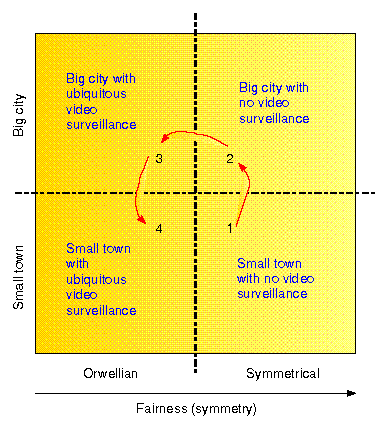Surveillance-free small town
versus big city with ubiquitous surveillance

The numbers in the above diagram show time-evolution.
-
First were the small towns. I can remember living in a small town
near Toronto, where we used to leave our doors unlocked. In addition
to less crime, in a
small town, if you were at home and fell down and hurt yourself,
it was quite likely a neighbour, perhaps coming over to borrow some
sugar, would find you and come to your aid.
-
Second, came the big cities. Here a person had a greater degree
of anonymity and ``privacy''. However,
there was often more crime in the big cities, so there was a tradeoff
to be made.
-
Third, came the big cities with ubiquitous video surveillance.
Living in a big city of this sort, we lose some of that anonymity, and,
in exchange, supposedly get reduced crime. However, we've shifted down
along the symmetry (fairness) access, and, in fact, while there may be
less shooting, less blood, on the street, there may still be unreported
crimes in higher places. In particular, who watches those who are doing
the surveilling?
If the small town sheriff was a crook, everyone knew about
it. In the small town, you were watched, but you also watched others.
People looked out for each other, and worked together, and this built
a sense of community.
Everyone knew
what you were up to, but you also knew what others were up to.
-
Fourth, comes the small town with video ubiquitous
surveillance. Video surveillance has
finally worked its way into the quaint little country craft shop.
Not only are there surveillance cameras, but also the darker side of video
surveillance -- hidden surveillance --
has filtered down into the small towns and villages.
Now even the small town general store has semi-silvered mirrors
and hemispherical domes of wine-dark opacity.
Having lost the anonymity and privacy we once had (at least in the big
city), and having lost the sense of fairness and symmetry of the small town,
what are we to do? One possible solution is to form groups
where we look out for each other, rather than rely on big-brother.
For example, neighbourhood watch is an excellent example, where communities
work together to reduce crime. Neighbourhood watch would also note
and report crimes committed by authority figures,
such as police and government. In order to maintain this symmetry,
it is important that those living in a community maintain the right to
report on illegal activity in establishments, such as shopping complexes,
gambling casinos, and the like. Therefore, an organization such as
a gambling casino, where there is ubiquitous video surveillance, but that
does not allow people to take pictures, goes against basic symmetry and
fairness principles. A neighbourhood watch community,
in which each member walked around with a 50 cent toy camera, even if it
has no film inside it, would go a long way to reducing crime at ALL
levels. At the very least, it would get the owners of various establishments
used to the idea of being watched by members of the community they serve.
An establishment owns their property, but they do not own those who
visit them. They have no more a right to ``shoot'' the individual, than
the individual has the right to ``shoot'' back.
If ``A'' is driving a
car owned by ``B'' to a repair shop owned by ``C'', ``B'' has as much a
right to have cameras in the car monitoring the quality of the work,
as ``C'' has a right to install surveillance cameras to make sure
``A'' does not steal tools from C's shop.
Of course the best situation would probably
be that all 3 parties have mutual trust, so that no surveillance need
be used.
As we often see on TV, when two parties are meeting, one will often
place a tape recorder on the table, and ask permission to record the
conversation, at which time the other will also bring forth a tape
recorder. When we sign a contract, we keep our own copy of the contract.
Thus it seems reasonable, that if we are in a shop that is using video
surveillance, we should keep our own video record of what we have done there
(or at least should have the option to do so),
just as radio stations keep a recording of everything they
broadcast (``station log''). The station log protects radio stations
from false accusations regarding what they have broadcast.
Surveillance takes care of shoplifting, but does
not deal with crimes higher up the social hierarchy, such as shopkeepers
who chain and padlock fire exits.
Neighbourhood watch, and similar programs, can both reduce the need for
Orwellian surveillance and also balance the asymmetry created
by Orwellian surveillance.
Privacy issues of wearable cameras
versus surveillance cameras .
.

 .
.